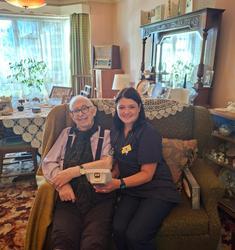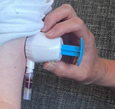Shifting healthcare to the community
The NHS 10-year plan sets out a clear ambition to move diagnostic and treatment services into community settings to improve access, reduce hospital pressures, and provide more integrated care closer to home.
Increasing the provision of safe and effective community-based diagnostic services will help reduce pressures on hospital beds and A&E wait times. Delivery will depend on resilient end-to-end pathology services both centrally and nearer to the patient.
The benefits of 'life changing' Hospital at Home Care ; Derek's story

Hospital at Home care, supported by point-of-care testing, helps reduce the need for hospital visits, offering a calmer and more convenient option for elderly patients.
The health challenge
Derek White-Taylor, a retired language teacher, has always been active and enjoys gardening. Now in his 80s, he still feels healthy, though age means he cannot always do as much as he would like. One day, after a fall, Derek’s stepdaughter and partner called an ambulance. At hospital, tests revealed atrial fibrillation, cellulitis in one leg, hypotension, and low potassium. He was prescribed blood thinners and diuretics.
The role of Point-of-Care testing
Rather than remain in hospital Derek was referred to the Hospital at Home team, allowing him to return home but still receive hospital level care. This was enabled by the East Berkshire Hospital at Home team using a point of care testing device which measured Derek's blood potassium and renal function markers. Results were available instantly giving Derek and his care team reassurance and allowed treatment decisions to be made immediately.
Without this Point-of-Care tests, Derek would have had to travel back and forth to hospital for blood tests and wait days to be informed of his results. A delay that could be harmful given how unwell his low potassium was making him.
‘A real benefit’
The rapid testing also meant treatment could be given safely at home, preventing unnecessary admissions, with the added stress of multipe hospital visits and increased risk of further infection. Derek is now recovering well and expects to be discharged from the Hospital at Home team soon.
Derek describes the experience as life changing. The support of the community nursing team and the convenience of testing at home have made a real difference to his health and quality of life.
“The Hospital at Home service has been excellent. It saves me the stress of going into hospital, and having the blood test done right here at home is wonderful. Getting the results straight away, instead of waiting days for the result, has been a real benefit.”

Abi's story; Providing reasonable adjustments for our LD patient population is "A game changer".
The Equality Act 2010 states that we should ‘…put in place ‘reasonable adjustments’ to help people with learning disabilities to use phlebotomy services.’
To date, desensitisation processes can involve the use of physical restraint or general anaesthetic. These processes are stressful for both patient and carer and are time consuming and costly. University Hospitals of Morecambe Bay are the first NHS Trust in the country to offer TAP for Learning Disabilities (LD) - a painless, patient centred experience with reduced anxiety for routine blood collections. If the NHS 10-year plan is to shift from hospital to community and from sickness to prevention, we must also carry our underserved patient population with us.

Abi is a wonderful 15-year-old girl. She has Downs Syndrome, learning disability and requires thyroxine treatment. For Abi to maintain adequate thyroxine dose she needs to provide a blood sample, but this has involved enduring months of desensitisation using various techniques. The whole process of blood taking has been distressing for her and her family and very time consuming.
Pilot Success
In a pilot group of 19 patients on our LD register, who had a poor phlebotomy history we provided successful capillary blood samples on all but one patient. These patients had never been able to provide a blood sample before or not within the past 1-4 years. We successfully diagnosed 1 patient with hypercholesterolaemia, 1 patient with elevated HbA1c and 2 hypothyroid patients who could then go on to have thyroxine prescribed.
Game changing, annual health checks are now accessible for LD patients who are also needle-phobic.
Relief for Mum as well
“…it really is a game changer for Abi and I’m sure many others like her. The hours we have put in trying to manage blood tests with social stories, practicing on dolls, desensitising her and it has still been traumatic having blood tests, well until yesterday! Abi has talked about TAP today saying it was ‘great fun’ and has proudly shown her arm to her friends and told them all about it.”
Abi is due to have her next health check in November and says she is looking forward to it.
“The fear of your child dying never goes away. Now I know I can keep her well” – Lucy’s Story
Lucy is a happy 16-year-old girl who has Down’s Syndrome with severe (LD) and autism. She has grown up requiring annual blood tests to review her thyroid function and other medical monitoring. In the early years, blood sampling was achieved with Lucy's mother holding her, but as Lucy grew older, this became more traumatic for Lucy and her mum.
Explaining blood tests to Lucy is not possible and a dedicated team of LD nurses and her GP have enabled Lucy to be desensitised to having blood pressure, pulse-oximeter and oral examinations. However, where pain is concerned, such as in routine phlebotomy, challenges remain.
Problems with basic levels of care
The most recent LeDeR report 2023 states adults with LD on average die 19.5 years younger than the general population. The most common avoidable deaths are influenza/pneumonia, cancers of the digestive tract and ischaemic heart disease. 28.4 % of avoidable deaths in 2023 experienced unmet care and diagnosis guidelines. Access to blood tests can help with early diagnosis and treatment.

Anxious parents struggle to find solution to keep Lucy safe and well
Lucy had years of failed blood draws, including attempts made with sedation. This led to opportunistic sampling with general anaesthetic (GA) and ultimately a period of years with no blood testing. Annual GA presented with too many risks to Lucy’s well-being. Lucy's mum declared them to be “in No Man’s Land” when it came to basic levels of care.
The worry and anxiety taken on board by parents/carers can be incomprehensible to those outside the caring network. When Lucy was hospitalised with an acute case of pneumonia which rapidly declined to multi-organ failure. Her mother says “Although it was years ago, the fear of losing your child never goes away”.
Capillary Blood Sampling – painless, patient-centred experience with reduced anxiety
Lucy was invited to use the TAP device for capillary sampling. Lucy's mum says: “Somethings are suggested to you as a parent, and you just know it will work. TAP sampling was one of those things. I can’ tell you how good it is to give reassurance that Lucy is well and we have laid the foundation for the future for her to have regular blood tests. I hope it will be available to her for the rest of her life.”
